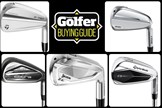Break into single figures this year! We look at the Best Mid-Handicap Irons 2025
Last updated:
Figuring out what irons will best suit you as a mid-tier golfer can be a minefield. Do you pick a smaller iron to progress into? A bigger head to provide more help? We look at the best clubs for you
Perhaps the most hotly contested iron category is the mid-handicap iron market. Every golfer wants to find the best golf irons for their game, and for many, it will be a set of the best mid-handicap irons because of their forgiving nature and all-round performance. After that, your game is sure to improve.
Mid-handicap irons arguably appeal to the widest range of golfers, I’ve witnessed single-figure handicappers gaming a set of forgiving game-improvement irons and beginner golfers playing with the exact same set! The versatility of the mid-handicap category is exceptional.
The best Mid-handicap irons at a glance:
Best overall: TaylorMade Qi Irons | View Offer
Fastest: Cobra DS-Adapt | View Offer
Best all-round performing: Titleist T350 | View Offer
Best feeling: Srixon ZXi4 Irons | View Offer
Best for loft options: Ping I530 Irons | View Offer
Best value: PXG Black Ops | View Offer
Sleekest: TaylorMade P790 | View Offer
Most affordable: Takomo 101 Irons | View Offer
Best low-launching: Wilson Dyanpower | View Offer
How do I choose the best mid-handicap irons for me?
If you feel as though you’d benefit from extra forgiveness, there are ultimate game-improver irons that are specifically designed to deliver forgiveness above all else. Similarly, on the other end of the spectrum, there are players’ irons for anyone looking for an increased feel in place of slightly less forgiveness. The least forgiving irons on the market are blades, these are reserved for the best ball strikers.
The majority of golfers want a set of irons that travel well (far) and hold the green. If you can find this with one of the best mid-handicap iron sets from 2024 you could save yourself some cash. There are a couple of iron sets that released in 2024 featuring among the best mid-handicap irons of 2025.
With the mid-handicap irons marketplace becoming increasingly crowded with direct-to-consumer brands and established manufacturers producing more than one model, it can be difficult to determine exactly which set of irons will be best for your game. However, it’s nigh on impossible to go wrong with one of the best mid-handicap iron sets of 2025.
How we tested the best mid-handicap golf irons
We invited major equipment manufacturers to submit their entire ranges for testing. Across seven weeks of testing, we created a controlled environment indoors at Keele Golf Centre and used a premium tour-level golf ball (the TaylorMade TP5x). We collected a ton of data from every shot hit, using a Foresight GC Quad launch monitor.
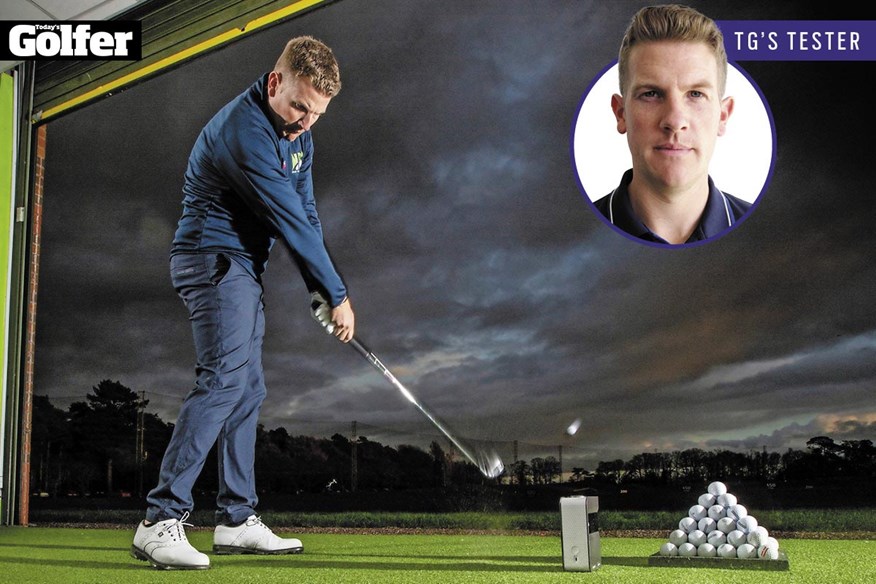
Why do we use a pro tester?
Speak to any golf club engineer about product testing and they all talk about needing a repeatable, reliable strike to offer any sort of valuable comparison. So, whilst we accept not all of the equipment included within our tests was designed for our test pro, what our data shows is a great comparison of how clubs in each particular category differ, which is hugely valuable in helping you narrow your choice as a consumer.
We tested 69 different 7-irons, during which our test pro missed a target green at 170 to 200 yards no more than a dozen times. He got a hole-in-one, lipped out, and hit the flag several times, he also loves hitting golf balls all day long. In short, Neil Wain is the perfect club tester due to his consistency in delivering accurate and reliable comparative data.
We would of course always recommend attending a proper fitting session, to ensure any purchase is tailored to your game.
See more about how TG tests golf clubs and other equipment.
Best Mid-Handicap Golf Irons 2025
Best Overall Mid-Handicap Iron of 2025
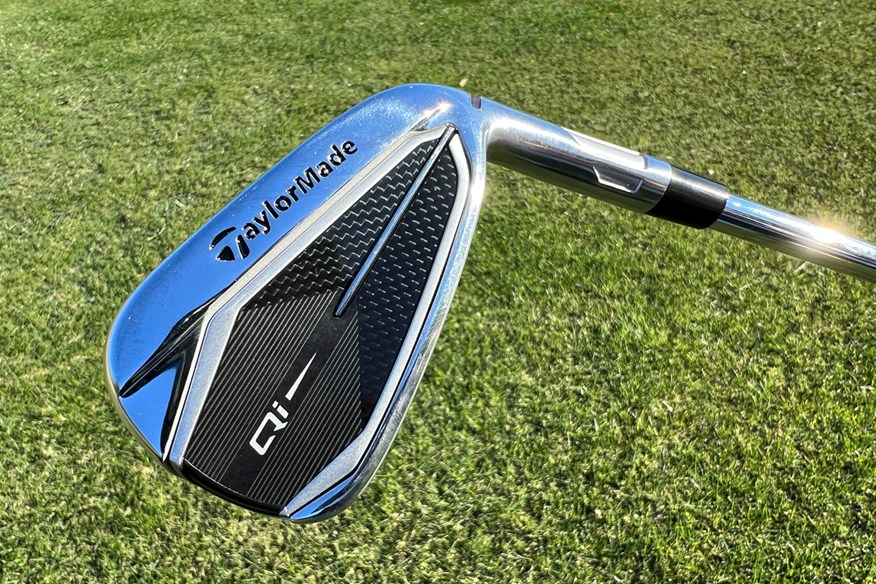

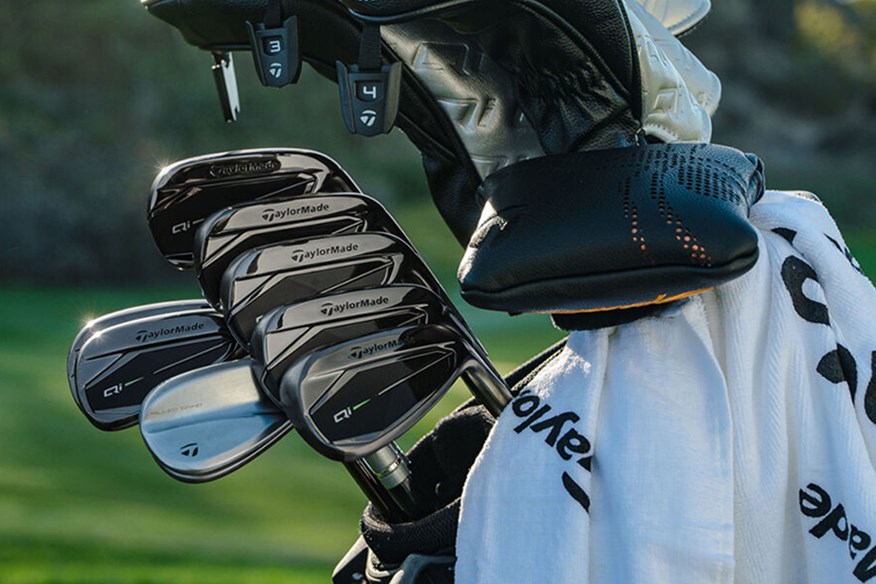
The winner of the specific Game Improver category across all the stats we look at, the TaylorMade Qi iron, despite being in its second year, proves it hasn’t lost any of its great quality.
TaylorMade have offered an update to the Qi finish options, in case you want to blend them in with a new Qi35 carbonwood set up, by giving you the choice between the original chrome and black, or you can pick the new gunmetal look for a smoky metal finish.
A tight, squared-off head shape looks good in any bag as well as at address, and the Cap Back and Speed Pocket designs help to provide impressive ball speed and consistency across the face.
What our tester says:
TaylorMade have put together a good option here, considering it’s the only Game Improver iron they offer. It needs to work for higher handicaps as well as the mid-handicap guys who are on the border of the Players Distance models transition, and it should work for both. Really great iron.
Data:
Loft 28º | Clubhead Speed 94.6 MPH | Ball Speed 129.1 MPH | Carry 187 Yards | Spin 5,745 RPM | Launch 15.3º | Height 33.6 Yards | Descent Angle 47.4º | L-R Dispersion 4.7 Yards
| Set Options | 4-PW, AW |
| Stock Shaft | KBS Max MT / UST Mamiya Recoil DART |
| Stock Grip | Lamkin Crossline |
| Left Handed | Yes |
Best Iron for Max Distance 2025
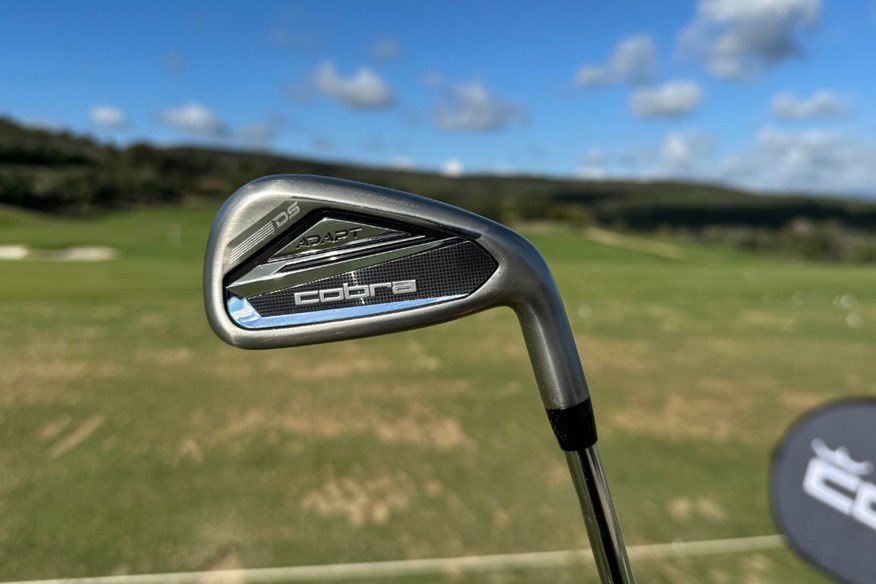

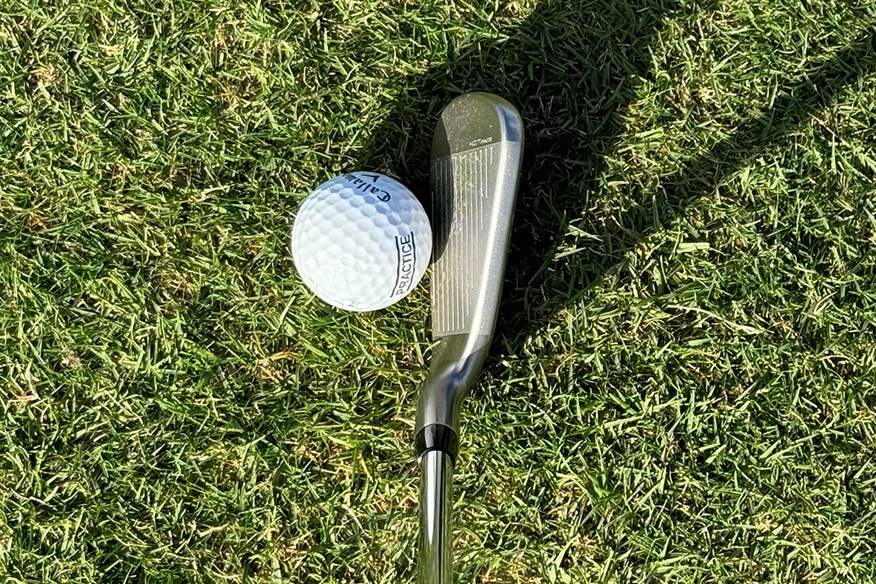
Cobra’s DS-Adapt iron is hot. Like really hot. While it does have the lowest loft of any of our Game Improver irons, when you’re seven yards longer than the next nearest model, we have to look at your performance and technology in some further detail.
While there’s lower launch (third lowest in the category, to be precise), the DS-Adapt actually sits within 100 rpm of the average spin rate, and slightly higher than average peak height and descent angle means this iron is actually playable to match its distance.
We’ll still recommend it for golfers with some more speed or ones generating a little more spin through their own swing at least. It’s a serious contender in the GI irons list.
What our tester says:
The gunmetal-style finish looks pretty different from anything else I’ve seen on the market. I’m not sure if it suits me, but I definitely prefer it over a completely black head. I do know it feels ridiculously fast though. I could almost use this 7-iron off the tee at my speed.
Data:
Loft 27º | Clubhead Speed 94.2 MPH | Ball Speed 129.5 MPH | Carry 194.3 Yards | Spin 4,667 RPM | Launch 15.6º | Height 33.5Yards | Descent Angle 46.2º | L-R Dispersion 4.0 Yards
| Set Options | 4-PW, GW, SW |
| Stock Shaft | KBS Tour Lite / KBS PGI |
| Stock Grip | Lamkin Crossline |
| Left Handed | Yes |
The most-forgiving iron set offered by Titleist
Best all-round performing mid-handicap irons
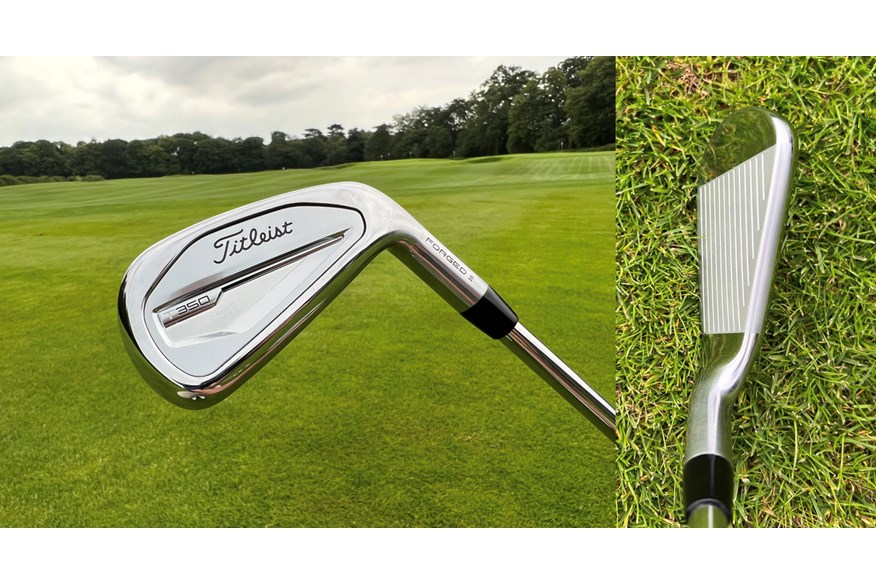

As golfers most of us want to play clubs we like the look of, especially when we’re often forking out over $1K/£1K for a decent set of irons. And if it’s looks you’re after there’s not many better looking or more attractive mid-handicap iron options on the market than the T350. I really like the straight top edge, how there isn’t a ton of hosel offset, and how even though the head's bigger than the Titleist T200 it’s still really attractive and easy on the eye when sat behind the ball.
Our test data shows the T350 almost to a tee follows our test averages, which to many might not scream top performer. But throw in a forged face, a ton of tungsten toe weighting to up MOI, and an array of top fitting options (which many in the category can’t compete with), and this model should at least be on mid-handicappers shortlist to try.
Personally, I’ve played the model since August 2023 and I really like the sound and feel along with how the slightly weaker lofts than some of the competition help flight shots for maximum playability and not just most speed or distance. To take full advantage of what Titleist have to offer ensure you get properly fitted as the brand prides themself on being custom fit leaders.
TG Test Pro Data 7-iron (29°):
Ball Speed: 125.5 mph | Backspin: 5159 rpm | Carry: 186 yds | Shot Area: 167.2 yds2
Read our full Titleist T350 irons review.
Pros
- Premium finish and quality you'd expect from Titleist
- Lovely sound and feel
- Workable lofts
Cons
- Not a standout performer but does everything well
| Stock shaft | True Temper AMT Red (s) | Mitsubishi Tensei Red AM2 (g) |
| 7-Iron loft | 29° |
An incredibly stylish set of irons that could easily be mistaken for players' irons
Sleekest mid-handicap irons
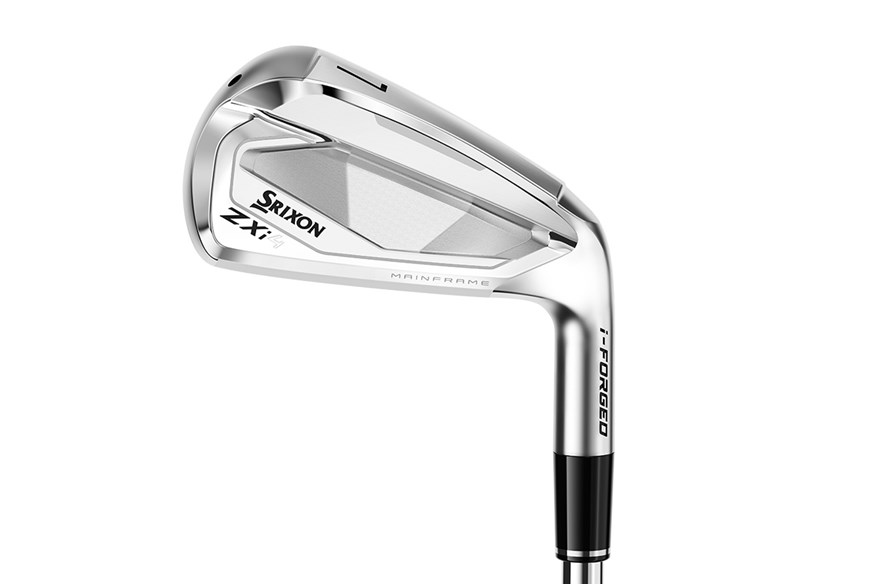

In the mid-handicap iron category, I love the ZXi4 for its simple elegance and straight-line beauty, it has a look that lots of golfers will appreciate sat behind the ball at address. Each head is not overly offset and the topline thicknesses across the whole ZX family are closely linked, which should encourage you to create your own personal combo set of two or more models.
Throw in all that good cosmetic stuff, with the model being one of our test pro’s favorite models plus an above-average performance for ball speed and carry distance and you’ve got a very powerful and desirable iron choice, even though most of the hottest competition is a year younger.
Data:
Loft 28.5º | Clubhead Speed 91.3 MPH | Ball Speed 124 MPH | Carry 186.7 Yards | Spin 4,521 RPM | Launch 17.4º | Height 33.4 Yards | Descent Angle 45.7º | L-R Dispersion 6.1 Yards
Read our full Srixon ZXi4 Iron Review
Pros
- Very smart looking club
- Feels incredible
Cons
- Not the most forgiving head
| Stock shaft | KBS Tour Lite (s), Diamana ZX (g) |
| 7-Iron loft | 28.5° |
Best Mid-Handicap Iron for Loft Options
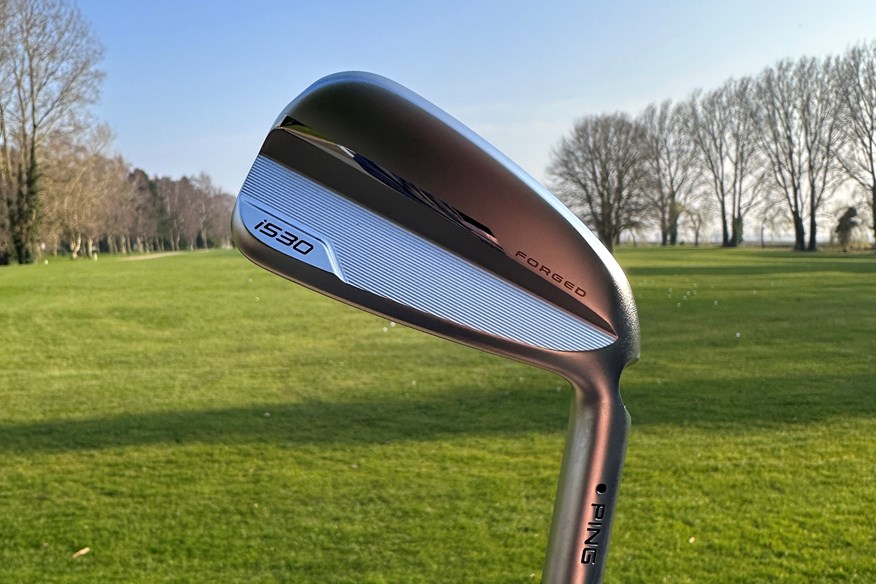

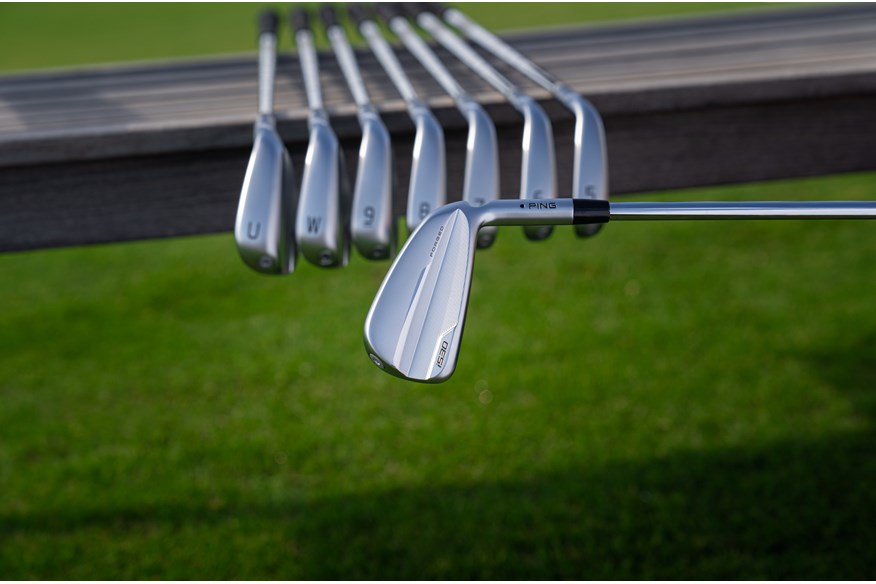
The i530 iron has come in as both our second best Players Distance iron overall and the longest model in the category. It’s a great highlight for how seriously Ping are taking this category now, showing they know how to make a versatile iron set as well as one that appeals to a particular subset of player, a la the G730 or Blueprint models.
There’s good reason to revisit the Retro and Power Spec Loft options as well, if you need to adjust these irons for trajectory, as well as the toe-sided screw that allows for precise internal weighting.
This iron feels powerful, but it doesn’t come at a cost of control either.
What our tester says:
It comes off the face so fast – I’m really impressed with Ping! You could definitely just play these as a complete set and not really have any issues with gapping. They look really clean. The simple finish works for the brand image, but you're sold on these from the first hit.
Data:
Loft 29º | Clubhead Speed 90.3 MPH | Ball Speed 123.5 MPH | Carry 184.8 Yards | Spin 4,686 RPM | Launch 17.5º | Height 33.3 Yards | Descent Angle 46.1º | L-R Dispersion 5.7 Yards
| Set Options | 4-PW, UW |
| Stock Shaft | True Temper Dynamic Gold Mid 100/115 |
| Stock Grip | Golf Pride Tour Velvet 360 |
| Left Handed | Yes |
Sleekest Mid-Handicap Iron



TaylorMade know their stuff when it comes to improving the games of everyday golfers – they’re at the forefront of technology in this regard.
The latest generation of the P790 have been refined in their technology but also in their sole design, with a wider camber across the whole base helping to improve the club-ground interaction from multiple different lies that will be encountered.
What our tester says:
You can immediately see TaylorMade’s point about this iron being one you can fit to a massive range of golfers. It looks good, oozes class despite the power under the hood, and it feels even better than ever when you make contact. I didn’t think they’d improve on the previous version, but they’ve surprised me.
Data:
Loft 30º | Clubhead Speed 92.3 MPH | Ball Speed 124.9 MPH | Carry 179.5 Yards | Spin 5,856 RPM | Launch 16.8º | Height 33.9 Yards | Descent Angle 47.9º | L-R Dispersion 2.7 Yards
| Set Options | 4-PW, AW |
| Stock Shaft | Nippon NS Pro Modus Tour 105 |
| Stock Grip | Golf Pride Z-Grip Plus2 |
| Left Handed | Yes |
A brilliant Direct To Consumer (DTC) option
Most forgiving mid-handicap irons
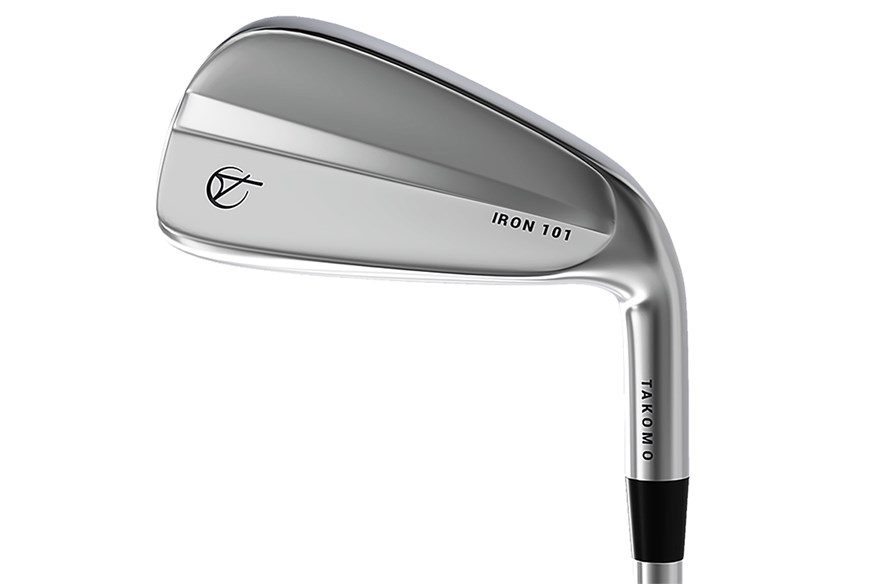

I’ve loved highlighting solid value-for-money equipment for years here at TG and Takomo’s simple, classy models are well worth a look in 2025, especially if you’re someone who doesn’t want to spend a fortune and will appreciate a decent-looking set of irons for $489 / £420.
With lofts 2-3 degrees weaker than many in the category this cast hollow body model is never going to compete on speed or distance alone (the model was 14 yards back from our very longest). However, when it came to how accurately our pro grouped shots with each iron, the Takomo with a 52.4 SQ YDS average (the test average was 273.5 SQ YDS), was a seriously impressive winner. You can now place orders directly at www.takomogolf.com in USD, GBP, and AUD.
TG Test Pro Data 7-iron (30°):
Ball Speed: 123.8 mph | Backspin: 4784 rpm | Carry: 184 yds | Shot Area: 52.4 yds2
Pros
- Super forgiving
- Incredibly affordable premium irons
- Solid stock shaft options
Cons
- Surprisingly low-spinning
| Stock shafts | KBS Tour (s) | KBS Max (s) |
| 7-Iron loft | 30° |
The lowest launching Mid-Handicap Iron
Best affordable mid-handicap irons
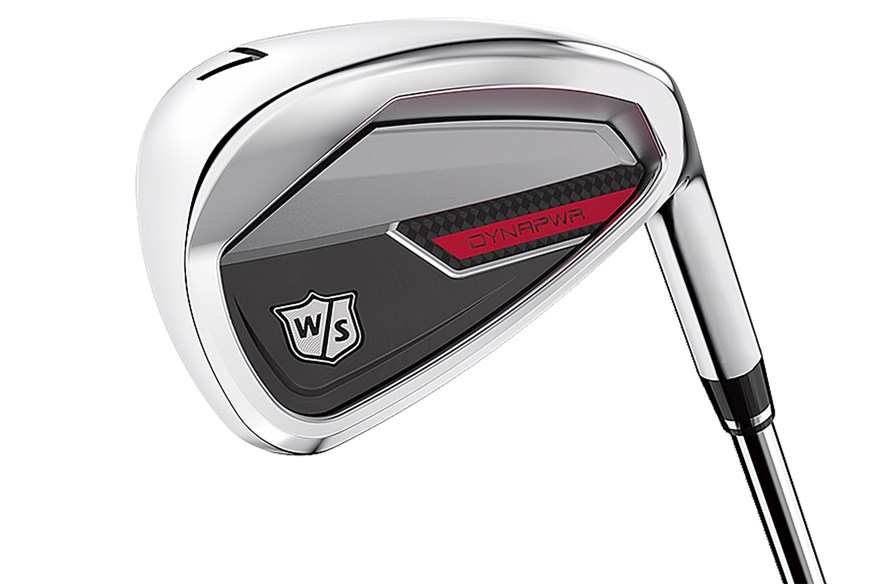

Thanks to the bigger head shape and more offset (which some like for reassurance and confidence, and others won’t) I reckon the model will be most at home in the hands of good-speed golfers who aren’t overly fussy about head shapes and profiles. If you’re 7-iron speed is creeping anywhere close to 75mph you’re highly likely to be better served by a more lofted HL alternative. If you’re after a bargain with the Dynapower you should be able to find the model for very sensible money.
Data:
Loft 28º | Clubhead Speed 90.9 MPH | Ball Speed 126.4 MPH | Carry 193.1 Yards | Spin 4165 RPM | Launch 15.1º | Height 29.9 Yards | Descent Angle 43.3º | L-R Dispersion 22.5 Yards
Pros
- Good distance
- Works well for slower swing speeds as well as quick
- Excellent value
Cons
- Not the best for generating spin
| Stock shaft | KBS Max Ultralite (s) |
| 7-Iron loft | 27° |
Best Mid-Handicap Golf Irons 2025: Launch Monitor Data
| Make | Model | Loft (º) | Club Speed (mph) | Ball Speed (mph) | Carry Distance (yds) | Spin Rate (rpm) | Launch Angle (º) | Peak Height (yds) | Descent Angle (º) | L-R Dispersion (yds) |
| Ben Hogan | Edge Ex | 32 | 89.5 | 119.1 | 173.0 | 5,357 | 17.1 | 30.4 | 45.5 | 2.4 |
| Callaway | Ai 200 | 30 | 89.3 | 121.5 | 180.0 | 4,843 | 17.4 | 32.0 | 45.6 | 9.9 |
| Callaway | Ai 300 | 29 | 88.7 | 121.4 | 180.8 | 4,671 | 17.1 | 31.2 | 45.1 | 13.0 |
| Callaway | Elyte | 29 | 90.4 | 121.6 | 181.5 | 4,603 | 16.7 | 30.7 | 44.6 | 9.9 |
| Callaway | Elyte X | 28 | 90.8 | 124.2 | 187.9 | 4,362 | 16.1 | 30.7 | 44.0 | 7.4 |
| Cleveland | Zipcore XL | 29 | 92.6 | 125.7 | 187.4 | 4,877 | 18.8 | 37.4 | 48.3 | 8.6 |
| Cobra | DS Adapt | 27 | 94.2 | 129.5 | 194.3 | 4,667 | 15.6 | 33.5 | 46.2 | 4.0 |
| Eleven | 7i | 31 | 90.7 | 120.0 | 168.5 | 6,811 | 16.6 | 30.8 | 46.5 | 14.6 |
| Mizuno | JPX 925 Hot Metal | 28 | 89.2 | 122.0 | 182.0 | 4,691 | 17.7 | 32.8 | 46.0 | 10.4 |
| Mizuno | JPX 925 Hot Metal Pro | 28 | 89.4 | 121.0 | 183.4 | 4,167 | 17.5 | 31.3 | 44.5 | 7.7 |
| Ping | G440 | 29 | 91.1 | 123.5 | 184.4 | 4,749 | 17.9 | 34.0 | 46.7 | 17.0 |
| Ping | G730 | 28 | 90.8 | 123.3 | 186.9 | 4,244 | 16.9 | 31.5 | 45.1 | 25.4 |
| ProtoConcept | C07 PC | 31 | 92.6 | 124.1 | 181.3 | 5,239 | 16.9 | 33.1 | 47.2 | 9.8 |
| PXG | GEN7 XP | 27 | 89.3 | 120.2 | 181.7 | 4,132 | 17.2 | 29.9 | 43.6 | 15.9 |
| PXG | Black Ops | 28 | 90.0 | 121.6 | 185.4 | 4,147 | 17.0 | 30.5 | 43.4 | 4.3 |
| Srixon | ZXi4 | 28.5 | 91.3 | 124.0 | 186.7 | 4,521 | 17.4 | 33.4 | 45.7 | 6.1 |
| Takomo | 101 | 30 | 92.1 | 123.6 | 183.3 | 4,713 | 16.8 | 32.2 | 46.5 | 5.2 |
| TaylorMade | Qi | 28 | 94.6 | 129.1 | 187.0 | 5,745 | 15.3 | 33.6 | 47.4 | 4.7 |
| Titleist | T350 | 29 | 89.1 | 122.1 | 184.7 | 4,299 | 18.0 | 32.9 | 45.6 | 31.1 |
| Wilson | Dynapower | 28 | 90.9 | 126.4 | 193.1 | 4,165 | 15.1 | 29.9 | 43.3 | 22.5 |
| Category | Average | N/A | 90.8 | 123.2 | 183.7 | 4,750 | 17.0 | 32.1 | 45.5 | 11.5 |
| Test | Average | N/A | 90.2 | 120.2 | 175.1 | 5,327 | 17.6 | 31.9 | 46.4 | 9.7 |
| Make | Model | Loft (º) | Club Speed (mph) | Ball Speed mph) | Carry Distance (yds) | Spin Rate (rpm) | Launch Angle (°) | Peak Height (yds) | Descent Angle (°) | L-R Dispersion |
| Ben Hogan | PTX Pro | 34 | 88.6 | 116.4 | 167.8 | 5,482 | 18.8 | 31.7 | 46.8 | 14.9 |
| Callaway | Apex Ti Fusion | 30.5 | 89.2 | 121.6 | 178.0 | 5,252 | 17.6 | 32.9 | 46.6 | 4.5 |
| Callaway | Apex Pro | 33 | 89.1 | 116.3 | 169.7 | 4,984 | 18.3 | 30.4 | 45.7 | 12.2 |
| Cobra | King Tec | 29.5 | 93.3 | 123.3 | 179.0 | 5,373 | 16.2 | 31.4 | 46.1 | 8.4 |
| Fourteen | TB5 | 30 | 93.6 | 125.4 | 184.5 | 5,075 | 15.9 | 31.9 | 46.1 | 12.6 |
| Mizuno | JPX 925 Forged | 30 | 89.9 | 121.0 | 180.9 | 4,576 | 18.0 | 32.5 | 45.9 | 5.8 |
| Mizuno | Pro 245 | 30 | 90.1 | 119.3 | 174.5 | 5,181 | 18.2 | 32.4 | 46.5 | 6.4 |
| Ping | i530 | 29 | 90.3 | 123.5 | 184.8 | 4,686 | 17.5 | 33.3 | 46.1 | 5.7 |
| ProtoConcept | C05 TP | 32 | 93.3 | 122.0 | 175.9 | 5,559 | 17.6 | 33.3 | 47.6 | 4.8 |
| PXG | GEN7 P | 30 | 89.1 | 120.6 | 179.4 | 4,706 | 18.4 | 33.1 | 46.2 | 10.5 |
| Ram | FXT | 30 | 88.5 | 118.8 | 172.7 | 5,353 | 18.7 | 33.0 | 47.0 | 8.8 |
| Srixon | ZXi5 | 31 | 90.5 | 122.0 | 182.9 | 4,539 | 17.8 | 32.8 | 45.7 | 10.0 |
| Takomo | 101 T | 32 | 91.8 | 120.9 | 171.3 | 6,167 | 17.6 | 32.9 | 48.4 | 13.7 |
| TaylorMade | P790 | 30 | 92.3 | 124.9 | 179.5 | 5,856 | 16.8 | 33.9 | 47.9 | 2.7 |
| TaylorMade | P770 | 33 | 91.0 | 120.1 | 167.6 | 6,780 | 16.6 | 31.1 | 47.4 | 6.8 |
| Titleist | T200 | 30.5 | 89.7 | 121.7 | 180.3 | 4,887 | 17.3 | 32.0 | 45.5 | 12.9 |
| Wilson | Dynapower Forged | 30.5 | 89.6 | 121.4 | 179.8 | 4,849 | 17.1 | 31.3 | 45.3 | 21.9 |
| Category | Average | N/A | 90.6 | 121.1 | 177.0 | 5,253 | 17.6 | 32.3 | 46.5 | 9.6 |
| Test | Average | N/A | 90.2 | 120.2 | 175.1 | 5,327 | 17.6 | 31.9 | 46.4 | 9.7 |
SUBSCRIBE TO TODAY’S GOLFER: Print and Digital access, discounts and rewards!
